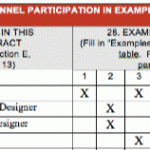
When writing proposals, you have to set your firm apart. So, what do we do? We try everything in the book to convince the client we are better. Our work is better, our people are better, and our customer service is better.
There is just one problem: that’s a huge mistake.
Tying to convince the client that you are better is actually a fool’s game. Much of the time, it will be near impossible to successfully convey that your firm is better. Here’s why:
You’re Probably Not Better
Yes, I just put it out there. Odds are your firm is not better. In a competition of 10, 20, or 50 firms, there can only be one firm that’s better than the rest. Those odds are not on your side. And there is really nothing you can do to make your firm the best in the couple of weeks before the proposal is due.
And let’s just say, for the sake of argument, your firm is the best. Is that going to be so obvious to the client that they couldn’t accidentally choose another firm? Is your firm a 10 and everyone else is a 2? Or is your firm a 10 and everyone else is a 9.5? If there is not a huge difference between your firm and others, it’s going to be extremely tough for the proposal evaluator to discern who the better firm is. You can’t assume they’ll pick up on subtle differences. Instead, they’ll focus on obvious differences, like price, to make their decision.
Different is Better Than Better
If you could only eat one of these for the rest of your life, which would you choose: a Mackintosh apple or a Fuji apple? 99% of you have no idea. That’s because it’s a tough choice. For the most part, an apple is an apple.
Let’s make that choice easier. If you could only eat one of these for the rest of your life, which would you choose: a Mackintosh apple, a Fuji apple, or an ice cream cone? It’s much easier to choose now, right? It’s easier to choose the ice cream cone because you only have to make one decision: ice cream over apple. If you choose apple, now you have a second decision: Mackintosh or Fuji. It’s easier to choose the thing that sticks out, the choice that is different.
It’s going to be easier to prove your firm is different than prove it is better. Different sells. Show that you are different. Different is better than better.
If you liked this article, please subscribe below or on the right side of the homepage. If you want to give us your thoughts on this issue, please leave a comment below.





Hi, Matt —
First of all, if it’s a New York State MacIntosh, it will win hands down!
You are absolutely correct about “different being better than better.” My experience has shown that if you look at one proposal from each of the 50 states, regardless of the project or client type, each firm’s description of why it is “unique” will look pretty much like the other 49 lists.
If you can truly determine what’s different about your firm, and then come up with a compelling reason why the client should think that such a difference is important to the success of the project, that has “winner” stamped all over it. Besides, what seems “better” to one client might not be important to another client.
Bernie,
I disagree with your one point. I’m partial to Fugi apples, mainly because they tend to be bigger.
However, as typical, I agree with everything else you said.
Thank you for reading and commenting! 🙂
I have to agree. As a bid writer, my sole aim is not to make my company better than the others, but to create a ‘best fit’. This means talking to the prospect in his/her own language, so that they can see themselves in what I have written (rather like the salesman who mimics the poses of his prospects to make them feel at ease). It’s all to do with mirror/mirror: simple things like American or British English, use the word client or customer, etc, are simple but necessary things. What I try to find is a differentiator that makes my company better on the day: I don’t care what it is, anything from price to colour (oops, sorry, should be color) or shape of my proposed solution, length of warranty, help desks, whatever. If bid writers could only ask one question, it would be ‘So what?’ Don’t flood me with features; give me benefits and search your soul for anything that makes what you are saying to me better than your competitors are going to be saying. Seems to work.
Thank you for the comment.
Spoken like a man who actually knows how to do AEC marketing. This goes beyond thinking from the client’s perspective to nearly becoming the client. Love the “so what?”
I have never approached proposals from the angle of being “different” only “better”. I will test your theory and let you know the results.
Stan,
Let us know how it works out!